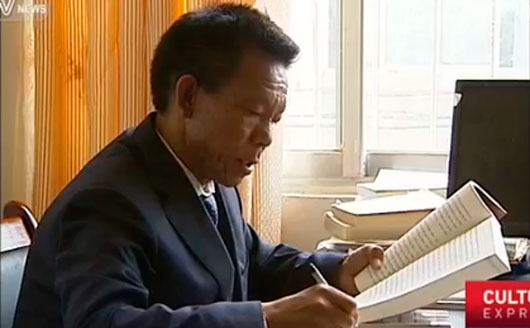 |
|
Puchung Tsering began the project in 2012. He collected five versions of the "Tripitaka" from Nathang, Beijing, Dege, Zhuoni, and Lainai. He used the copy from Dege - which was the most complete - as a reference.[Photo/CNTV] |
A new quadrilingual dictionary is bridging linguistic gaps in world Tibetology and Buddhist studies. Thanks to Tibet University, scholars and readers can now find a common language.
It's a dictionary for Buddhist studies, in Tibetan, Sanskrit, English and Chinese. The "collective works of translated terms" was compiled by Professor Puchung Tsering of Tibet University. It's a key project of the Social Sciences Research Base of the Ministry of Education.
The Buddhist terms are taken from the "Tripitaka", or Tibetan-Sanskrit Buddhist Canon originally compiled in the 8th Century. Other related names of Indian Buddhist origins have been included such as those of mountains, rivers, flowers and other natural objects, as well as ancient Indian philosophers.
Puchung Tsering began the project in 2012. He collected five versions of the "Tripitaka" from Nathang, Beijing, Dege, Zhuoni, and Lainai. He used the copy from Dege - which was the most complete - as a reference.
"The most difficult thing is to collect materials. Most were found in local Tibet libraries and some were from the National Library in Beijing," said professor Puchung Tsering, from Tibet University.
Puchung Tsering says many terms lack a corresponding translation from the original Sanskrit. So many scholars have published academic papers using terms taken directly from Sanskrit without any corresponding English translation or Latin transliteration. This makes it difficult for readers to understand if they don’t know the meaning.
This dictionary provides translated terms in four languages, as well as international standard Latin transliterations.
"Communication is very important, so this is an international general reference book for translators. This dictionary also helps the younger generation of Tibetan scholars to grasp more Sanskrit terms and conform with the international standard," said professor Tsering.
In addition to the original Sanskrit retrieval directory, the dictionary also features a Tibetan alphabetical search directory. Puchung Tsering says he will continue to sort out the English and Chinese search directories to benefit more diverse language users.
|
|
|
|
|
|
|
|
